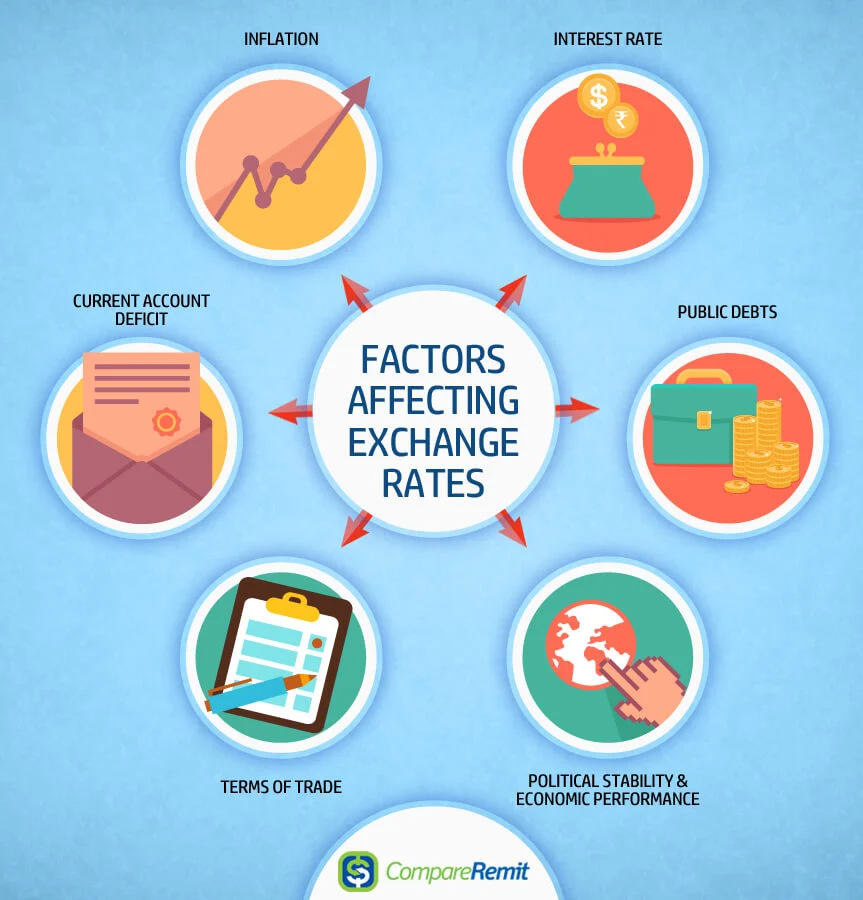Exchange rates have a big impact on the global economy, affecting everything from international trade to a person’s purchasing power. They can shift quickly and affect businesses, investors, and governments. Understanding how these rates are determined is important for finance researchers, international traders, and economics students. In this blog, we will explore what are exchange rates, how exchange rates are determined and introduce nine key factors that influence these fluctuations.
What Are Exchange Rates?
Exchange rates are used to indicate the value of one currency relative to another. They have a significant impact on international finance, influencing trade, investment, and economic stability. Whether you’re buying a product from another country or planning an overseas trip, the exchange rate impacts the cost and value of your money.
These rates are not fixed. They fluctuate depending on a variety of financial, political, and psychological variables. Understanding currency exchange rates can help you better manage your finances and make informed decisions.
How Are Exchange Rates Determined?
Exchange rates can be determined through various systems, such as floating, fixed, or pegged rates. In a system that uses floating rates, the value of a currency depends on how much people want and need it compared to other currencies. A fixed rate system, on the other hand, compares the value of a currency to that of another single currency or a basket of currencies.
The rate at which one currency trades for another is influenced by multiple factors. Some of these can be predicted or analyzed, but others are driven by more unpredictable elements, like market psychology.
Nine Key Factors That Influencing Currency Fluctuations
1. Economic Indicators
Economic indicators such as GDP growth, unemployment rates, and retail sales statistics play a significant role in currency valuation. A strong economy with healthy growth rates and low unemployment will typically see its currency strengthen. Conversely, weak economic performance can lead to a decline in the currency value.
2. Interest Rates
Interest rates set by central banks are one of the most influential factors in determining exchange rates. Higher interest rates give lenders a better return compared to other countries. Therefore, higher interest rates attract foreign capital and increase the value of the currency.
3. Inflation Rates
Inflation is another crucial factor. Countries with lower inflation rates experience an increase in their currency value as their purchasing power surpasses that of other currencies. In contrast, high inflation devalues currency value, leading to depreciation.
4. Political Stability and Performance
Political events and stability have a big impact on how much money is worth. Countries that have fewer political problems are more attractive to foreign investors. Political stability tends to make a currency stronger. On the other hand, political instability can lead to a lack of confidence in a currency, causing it to lose value.
5. Government Debt
The amount of government debt can also influence exchange rates. Countries with high debt are less likely to attract foreign investment, leading to depreciation. High levels of debt can also result in inflation, which will weaken the currency further.
6. Speculation
Market psychology and speculation can influence currency price fluctuations. If investors believe that a currency will strengthen in the future, they will buy more of it now, driving its value up. If investors think a currency will weaken, they’ll sell it, which will make its value go down.
7. Trade Balance
The trade balance of a country, which is the difference between its exports and imports, can influence its currency’s value. A trade surplus can lead to a stronger currency, while a trade deficit can weaken it.
8. Foreign Exchange Reserves
The amount of foreign currency reserves held by a countries central bank can have an impact on exchange rates. Large reserves can provide a safeguard against currency fluctuations, which makes the currency more stable and attractive to investors.
9. Market Sentiment
Investor sentiment and market psychology can impact exchange rates. Positive news about a countries economic performance can lead to greater investment and a stronger currency. Negative news can have the opposite effect. Market sentiment is usually influenced by news, events, and the overall economic outlook.
Impact of BTCdana on Currency Exchange Rates
BTCdana, a cryptocurrency trading platform, has been gaining momentum in influencing currency exchange rates. By offering a decentralized platform for trading digital assets, BTCdana is changing the way currencies are traded world-wide. The rise of cryptocurrencies has made the foreign exchange market more complicated and exciting.
The role that BTCdana plays in the market can’t be ignored. It provides liquidity and provides alternative investment opportunities, which could influence traditional currency values. For example, as more investors turn to cryptocurrencies via platforms like BTCdana, they may reduce their investments in fiat currencies, which will impact their demand and supply.
BTCdana uses blockchain technology to make it easier to exchange currencies. BTCdana gives a sneak peek into the future of global finance by reducing the reliance on traditional banking systems.
Final Thoughts
Understanding how exchange rates are determined can help you make smart financial decisions, whether you’re a trader, student, or finance enthusiast. The complex world of currency valuation is influenced by the interplay between supply and demand, economic indicators, political stability, and platforms like BTCdana.
In the future, emerging technologies and platforms like BTCdana are likely to have a bigger impact. Staying informed and responsive will be crucial as these new dynamics unfold.
Exchange rates will continue to fluctuate; however, with adequate knowledge, one can effectively navigate the financial landscape. If you’re interested in learning more, consider joining a finance newsletter, joining online forums, or taking an economics course. Happy trading!



